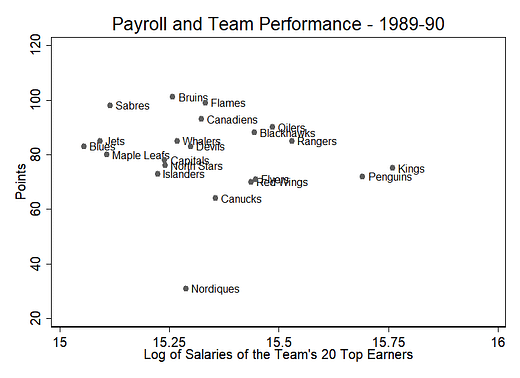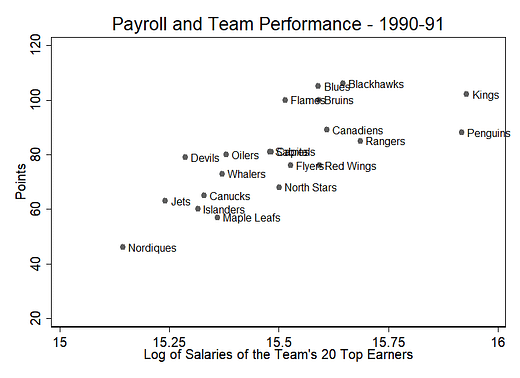Best of #econtwitter - Week of September 11, 2022 [1/2]
Sep 14, 2022
Welcome readers old and new to this week’s edition of Best of Econtwitter. Please submit suggestions — very much including your own work! — over email or on Twitter @just_economics.
This is part one of two.
Paper summaries

Jim Flynn@jim_flynn9
I am thrilled to share my first publication, “Salary disclosure and individual effort: Evidence from the National Hockey League”, recently accepted at JEBO.
A 🧵 on how a sudden shift to pay transparency impacted the NHL labor market. #EconTwitter authors.elsevier.com/a/1ffUPc24a-eN8
6:52 PM · Sep 6, 2022
70 Reposts · 333 Likes

Jim Flynn@jim_flynn9
Interestingly, on a team level, while there was virtually no correlation between team payroll and team performance in the season leading up to disclosure (1989-90), the two become immediately and permanently linked after disclosure, with higher-paying teams winning more games.


6:52 PM · Sep 6, 2022
7 Reposts · 35 Likes

Chris Felton@cfelton_
Using instrumental variables in your research? Teaching IV this semester? @b_m_stewart and I have a new paper for you: osf.io/preprints/soca…
We have 3 goals:
-clarify IV assumptions
-illustrate the fragility of IV
-help researchers w/ a checklist
(1/11)

11:51 AM · Sep 6, 2022
181 Reposts · 857 Likes

Chris Felton@cfelton_
Our discussion of IV assumptions aims to be both accessible and rigorous. We annotate and color-code all equations and graphically depict violations of assumptions when possible. Instruments in blue, treatments in green. (2/11)

11:52 AM · Sep 6, 2022
8 Likes
^color coding: underrated

ky@kylefbutts
🎉 New Working Paper: This paper, joint with Nick Brown, shows how to estimate treatment effects *when* parallel trends fails
Full paper & 5 Minute Summary: kylebutts.com/papers/general…

12:22 AM · Sep 9, 2022
36 Reposts · 174 Likes

Rigissa Megalokonomou@rmegal
Our paper on human capital depreciation is finally forthcoming in the American Economic Review (joint work with @mikedinerstein and Constantine Yannelis). We show that human capital depreciates when skills are unused using data from teachers in Greece.

AEA Journals @AEAjournals
Forthcoming in the AER: "Human Capital Depreciation and Returns to Experience" by Michael Dinerstein, Rigissa Megalokonomou, and Constantine Yannelis. https://t.co/12BMznjaLh
4:02 AM · Sep 5, 2022
60 Reposts · 393 Likes

Evan Soltas@esoltas
A paper I missed, seems under-appreciated: The much-discussed fall in interstate migration seems to be in large part a result of data issues, particularly changes in rates of real moves that aren't self-reported and of self-reported moves that aren't real. www2.census.gov/ces/wp/2016/CE…


12:33 PM · Sep 7, 2022
6 Reposts · 38 Likes

Mike Makowsky@mikemakowsky
Main result: greater access to firearms in the Black community reduced the rate of lynching in the Jim Crow South. In a context where you are excluded from the institutions of governance and public safety, where terrorism against you is condoned, the tools of self-defense matter
4:37 PM · Sep 7, 2022
14 Reposts · 54 Likes

Robert Metcalfe@RDMetcalfe
New @nberpubs working paper out today:
"Race and Redistribution in the United States: An Experimental Analysis"
nber.org/papers/w30426
with @jesper_akesson, Bob Hahn, & Itzhak Rasooly
#econtwitter

4:16 PM · Sep 5, 2022
71 Reposts · 223 Likes
Public goods

Johannes Matzat@matzatecon
Does the internet change lives in rural India?
New data! 💽🚩
Village-level broadband internet connection data covering over 175,000 villages
Linked to SHRUG
Access: bit.ly/3RHyia3

11:56 AM · Sep 13, 2022
79 Reposts · 404 Likes

Jacob Robbins@thesugar
✨✨Announcement✨✨ we are launching a new data source to study the evolution of spending inequality: Real Time Spending Inequality! spendinginequality.org @LoujainaAbdelw1 @ShogherOhanness
spendinginequality.org
Real-time spending inequality

8:11 PM · Sep 9, 2022
6 Reposts · 12 Likes
Interesting discussions

Lukas Freund@_LukasFreund_
"tech firms hired one in seven newly minted PhDs [from ten leading economics graduate programmes in the US] in 2022, up from less than one in 20 in 2018"
economist.com/business/2022/…

2:02 AM · Sep 12, 2022
81 Reposts · 351 Likes
^does the “Sources” footnote here imply they hand-collected this data themselves? (Was there a paper recently that did this same analysis?)

Dean Eckles@deaneckles
Yes, tech companies are hiring econ PhDs, but I think this misses the bigger picture here: Quantitative social scientists of many stripes working at tech companies.
🧵
For example: I think Meta employs more political science PhDs than economics PhDs.

Jaume Vives-i-Bastida @jaumevivesb
Excited to be featured on the Economist! Why are economists so valuable to tech companies? @steve_tadelis @Econ_4_Everyone
Why economists are flocking to Silicon Valley https://t.co/gqzRTn92zk
3:51 PM · Sep 8, 2022
19 Reposts · 123 Likes

˚✧₊⁎ emily case ⁎₊✧˚@crembrulemily
when is it safe to link a paper draft on your website, without having to worry about the idea being scooped? & is there some formal threshold between "works in progress" and "working papers"?
8:09 PM · Sep 9, 2022
1 Repost · 51 Likes

dylan matthews@dylanmatt
Academic book pricing is so wild. I guess I'll just, uh, not learn about Botswana's economic history then
smile.amazon.com/dp/B07BGV53C8

7:20 PM · Sep 6, 2022
12 Reposts · 262 Likes

